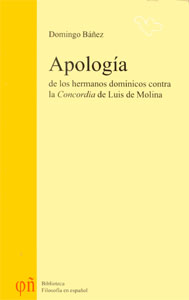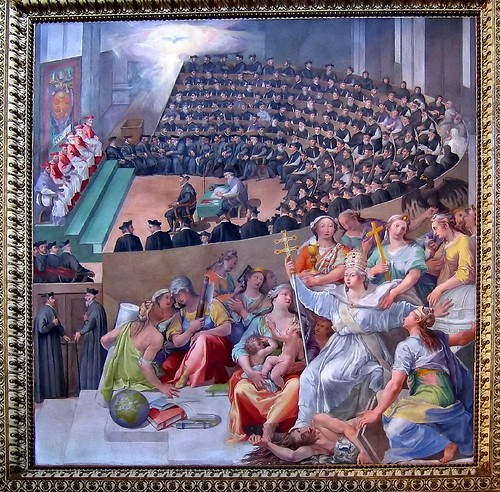Predestination and Free Will: A Survey of Views
The Bible clearly teaches Predestination (see Romans 8-9) and the men of the Renaissance and of the Early Modern Period were well aware of this. None of them would deny that God predestines certain men to eternal salvation. Where they differ is in their attempts to reconcile the fact of predestination with the idea that man has free will. Some simply denied free will, while others explained free will in a way that it could be compatible with divine predestination. So, in short, the Bible teaches predestination.
The Protestant heretics (such as Luther and Calvin) affirmed that God predestined men to eternal life, but they denied that man has free will (since the fall of Adam and Eve, when the human race contracted original sin), and consequently they also denied that man can merit eternal salvation in any way whatsoever. So the reformers in general have: predestination with no free will and no merit.
 Luther taught that God predestines certain men to salvation, and this they cannot merit because it is not in their power to chose (there is no free will since the fall of Adam and Eve); however, God did not predestine any men to eternal damnation, but rather they simply earn their damnation through their lack of faith--this is called positive or single predestination. In short, Luther has: single predestination with no free will and no merit.
Luther taught that God predestines certain men to salvation, and this they cannot merit because it is not in their power to chose (there is no free will since the fall of Adam and Eve); however, God did not predestine any men to eternal damnation, but rather they simply earn their damnation through their lack of faith--this is called positive or single predestination. In short, Luther has: single predestination with no free will and no merit. Calvin taught that God predestines BOTH certain men to eternal salvation AND others to eternal damnation--this is called double predestination--and neither group earns its destiny because they do not have free will since the fall. In short, Calvin: double predestination with no free will and no merit.
The Catholic Church teaches that there is positive predestination (to salvation) and that man does have free will (i.e., free will was not lost as a consequence of original sin). Predestination, then, means that God chose from all eternity that certain men will USE THEIR FREE WILL to cooperate with His grace and thus merit (in a certain sense) their salvation. But the Church condemns double predestination (which includes predestination to eternal damnation) and teaches that those who are damned are damned because they simply chose to reject God, not because He has predestined them to be damned. In short, the Catholic Church has: single predestination with free will and merit. But this still allows different Catholic theologians to explain how these three facts (single predestination, free will, and merit) fit together:
 Thus, Banez affirms everything that the Church teaches (predestination, free will, and merit), but he adds this explanation, taken from St. Thomas Aquinas: God, stands outside of history and is not part of history, is the one who causes all things and, therefore, for a free act to exist, God must cause it. This is the famous "premotion." Thus, all of our acts are BOTH free AND caused by God, and this is not a contradiction. So, in short, Banez has: single predestination with free will, merit, and divine premotion.
Thus, Banez affirms everything that the Church teaches (predestination, free will, and merit), but he adds this explanation, taken from St. Thomas Aquinas: God, stands outside of history and is not part of history, is the one who causes all things and, therefore, for a free act to exist, God must cause it. This is the famous "premotion." Thus, all of our acts are BOTH free AND caused by God, and this is not a contradiction. So, in short, Banez has: single predestination with free will, merit, and divine premotion.Whereas Molina affirms everything that the Church teaches (BOTH predestination AND free will), but he adds this explanation: God is the cause of all things, except man's free will: He only cooperates with free will. But he cooperates with their will because he has a 'scientia media' (i.e., pretty much an 'educated guess') of their future choices: that is, he does not cause human beings to perform salutary acts (acts that will get them to heaven), but only knows who will choose salvation and because of this He cooperates with them to lead them infallibly to salvation. Predestination, then, consists merely in foreknowing the salvation of certain men, and not in infallibly causing their salvation. So, in short, Molina has: single predestination with free will, merit, and mere concurrence.
Báñez's commentaries on Aquinas' Summa Theologiae are available through ITOPL.
Báñez's commentaries on Aquinas' Summa Theologiae are available through ITOPL.






.jpg)






5 comments:
Francisco,This has been so helpful. I always struggled where everyone was classified as in terms of the different systems of thought out there. I have a question though; would you have a lsit of folks that would fall under each of the two categories (molinism and premotion)? Also,what do we do with the texts in Aquinas that seem to imply double predestination? Again, thank you for this information.
I have not analyzed those texts, but one of the dogmatic manuals I read once said that they can be interpreted as negative predestination: God does not positively damn them to hell from all eternity, but simply does not predestine them, which means that they will infallibly be damned.
Whoever wrote this article does not really understand what Calvin really believed regarding predestination and free will.
Ask me why did I say so, I'll tell ya....
Please enlighten me.
"But the Church condemns double predestination (which includes predestination to eternal damnation) and teaches that those who are damned are damned because they simply chose to reject God, not because He has predestined them to be damned."
Is this correct? Dr. Ott teaches that God eternally resolves to exclude certain rational creatures from eternal bliss. This is not because of an unconditioned will to demonstrate his justice (Calvin, Wyclif), but in a conditioned will to exclude those who have demerited damnation themselves (Fundamentals, 244-5). He teaches that it is a de fide dogma that "God by an eternal resolve of his will, predestines certain men, on account of their foreseen sins, to eteneral rejection". Isn't this still predestination to Hell, just as according to Bellarmine there is a conditioned predestination to Heaven (conditional on future merits)? In other words, God predestines the reprobate to Hell because He knows that they will reject Him, thus affirming free will, demerits, the holiness of God, and predestination.
Did you say that the Church condemns double predestination because of Trent, or an encyclical against the Jansenists? I'm not sure if such a condemnation occured...
Post a Comment